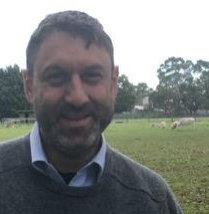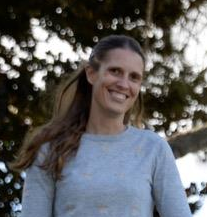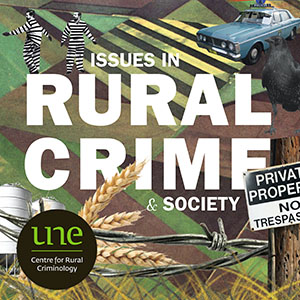What is Rural Criminology?
‘Rural criminology’ is a field of research that acknowledges rurality and community size has an impact on the incidence of crime, types of crime, response to crime and access to related services.
University of New England was a pioneer in this field of research, which remains well-placed to lead research in this field due to its location in regional Australia and acknowledged expertise in criminology.
About the Centre for Rural Criminology
The Centre for Rural Criminology is a world-first hub of collaborative international research, based at UNE. We seek to understand all aspects of rural crime in order to help build safe and resilient communities.
The Centre for Rural Criminology builds on UNE’s pioneering role in the development of the field of rural criminology.
It brings together scholars, higher degree research students, practitioners, organisations and communities to support collaborative national and international multidisciplinary research and the publishing of scholarly work into areas of national and global significance.
Together, the centre’s researchers and partners study the most compelling social problems that impact upon rural communities; from livestock theft and illicit drugs, to environmental crimes and interpersonal violence, and others. The centre aims to:
- lead and facilitate collaborative research and output in the field of rural criminology
- build links between academia, industry and the community
- inform progressive policies related to rural crime
- produce valuable information that can enhance the health and wellbeing of rural communities.
Centre launches national Farm Crime Survey
The first attempt in more than 20 years to build an understanding of rural crime on a national scale was launched on 16 June, 2023, by UNE’s Centre for Rural Criminology.
The Centre’s 2023 Australian Farm Crime Survey asks landholders to detail their experiences of rural crime, and gather opinions about the effectiveness of crime prevention.
The survey seeks to gain a better understanding of the climbing rate of rural crime from the perspective of farmers and landholders.
To view the survey, click here or use the following QR code:

Read more about the survey and its intent here

Rural Crime Photo Competition
This Australia-wide photo competition aimed to collect and curate original photographs depicting crime in rural settings.
The photographs submitted to this competition contribute to efforts to define and debate perceptions and representations of rural crime, and outline the diverse nature of rural offending and victimisation.
NSW Farm Crime Survey 2020 report
In 2020, Dr. Kyle Mulrooney, co-director of the Centre for Rural Criminology (UNE) undertook the New South Wales (NSW) Farm Crime Survey to better understand the extent of the present problem, its impacts on landowners and primary producers, and the most effective and achievable solutions. The survey sought valuable information from those involved in farming, who have key insights into the important issues, on several key issues, including; their experiences and perceptions of farm crime; their attitudes towards the policing of and criminal justice responses to farm crime and; their awareness and implementation of crime prevention measures.
To view the Farm Crime Survey's outputs, see below:
- NSW Farm Crime Survey infographic
- NSW Farm Crime Survey 2020 full report
- NSW Farm Crime Survey video snapshot
Centre directors
Dr Kyle Mulrooney Co-director
Researcher profileDr Alistair Harkness Co- director
Researcher profileUNE Centre for Rural Criminology
The impact of COVID-19 on the NGO alcohol and other drug sector in Australia The Network of Alcohol and other Drugs Agencies (NADA) has engaged the Drug Policy Modelling Program (DPMP) to conduct a research on the impact of COVID-19 on the demand for treatment(e.g. numbers seeking help), service delivery (e.g. changes in delivery modalities), workforce (e.g. training activities) and business practice (e.g. financial impact) for AOD treatment services. This project also focuses specifically on the unique barriers and challenges for regional, rural and remote services. Rather than merely describing what has happened the project will consider the implications of these impacts for: the NSW NGO AOD treatment sector; service delivery modes; the funders of treatment; and the recipients of treatment. This project is led by Prof Alison Ritter (UNSW) and Dr Katinka van de Ven (UNE). Contact: To get involved or for questions, please contact Katinka van de Ven International farm crime research project This project is focused on advancing knowledge of agricultural crime. This is an ongoing endeavour to examine types, extent and location of farm crime around the globe; consider attitudes of farmers and farming communities to criminal justice responses to farm crime; assess existing policing practices and analyse alternatives; and determine a suite of strategies for prevention and control of crime against farms and for improvement of service delivery by criminal justice systems. Project lead: Alistair Harkness, Senior Lecturer, UNE Criminology New South Wales Farm Crime Survey 2020 This project examines the extent of crimes that impact on pastoral, agricultural and aquacultural operations; considering victimisation experienced by farmers, as well as their perceptions of crime and responses to crime by the police, as well as their own uptake and employment of crime prevention tools and techniques. Building on a history of benchmarking rural crime survey conducted at UNE, this project will help us better understand the scope of the problem and plan effective measures that can be taken by the government, law enforcement agencies and farmers to reduce the incidence of farm crime across NSW. Project lead: Dr Kyle Mulrooney, Co-director, UNE Centre for Rural Criminology Farm Security and Acquisitive Crime: An evaluation of Ceres Tag for the interruption and reduction of livestock theft The overarching purpose of this project is to evaluate the application of the Ceres Tag smart animal ear tag on improving farm security, and to determine the efficacy of this technological intervention aimed at preventing and responding to the theft of livestock. Specifically, in partnership with the New South Wales Police Rural Crime Prevention Team, the project will undertake a Proof of Concept focused on the reactive capacity of Ceres Tag to (a) provide near real-time information on stock agitation and/or disturbance; (b) alert on a breach of boundary by tagged stock ; and (c) provide GPS location to intervene in stock theft/recover stolen stock. Project lead: Dr Kyle Mulrooney, Co-director, UNE Centre for Rural Criminology Farm trespass research project Farm trespass is a very topical issue that is capturing community, media and political attention – and yet there exists a distinct research deficit. Unauthorised access to farms can create social and economic harm to individual farmers and farming communities – and to the wider agricultural sector by way of bio-security threats. This project considers the incidence and extent of farm trespass in Victoria and New South Wales, with particular attention to animal activism and illegal hunting. It aims to investigate the criminological tensions which exist in rural communities between farmers and trespassers; the role of police as ‘the thin blue line’; the use of emerging technologies (such as drones, cameras) as forms of non-present trespassing events, and an array of situational crime prevention measures. Consideration is also given to practical criminal justice responses to farm trespass, including the potential for legislative reform and changes to policing policy and practice. Project team: Alistair Harkness (UNE); Dr Kyle Mulrooney (UNE); Prof Rob White (University of Tasmania); Dr Cassie Pedersen (Federation University) Over-Incarceration of Indigenous Australians: The Impact of Prejudice, Punitive Attitudes and Rurality. Indigenous Australians are heavily over-represented in the Criminal Justice System of Australia. Explanations for this are complex and multifactorial. However, very little attention has been paid to the role of prejudice and, in particular, how preconceived perceptions may shape punitive attitudes towards Aboriginal offenders. Leading research indicates that punitive attitudes are associated with racialized perceptions of crime and criminality. Moreover, rural criminological research has posited that such perceptions and attitudes may be exacerbated in rural environments. Such attitudes may facilitate increasingly punitive political and policy responses to crime, as well as impact upon the reintegration of offenders' post-release from custody, thereby contributing to Aboriginal rates of incarceration. Drawing on a representative survey of the Australian public, this dissertation will examine the relationship between prejudice, lay theories of race, minority threat and punitive attitudes as it relates to a) views on crime causation; b) support for particular measures to deal with offenders; and c) perceptions on offender capacity to rehabilitate and reintegrate. Furthermore, the research will also consider whether such attitudes and perceptions are compounded in rural environments. Finally, utilising semi-structured interviews with Indigenous Australians living in rural areas who have served a period of incarceration, the study will explore how self-reported experiences of prejudice shaped the navigation of each level of the criminal justice system interaction from court to custody to reintegration post-release. Taken together, the dissertation aims to fill a gap in the literature by providing an empirical and holistic understanding of the relationship between prejudice, punitiveness and the rural. Most importantly, drawing on the findings, we may consider novel opportunities for intervention and policy efforts aimed at addressing the role of prejudice in the over-representation of Indigenous Australians in the Criminal Justice System of Australia. Caitlin Davey discusses the research project in the 2021 Oorala Research Seminar Series. Watch now. Project lead: Caitlin Davey supervised by Dr. Kyle Mulrooney (UNE). Policing Rural Crime and Rural Communities Much of the available research on rural crime (generally) and farm crime (specifically) focusses on the perspectives of victims: very little empirical evidence is offered examining these issues from the perspective of police – either frontline or command. The aim of this study is to provide a comprehensive overview rural policing by drawing on the experiences and perspectives rural police services in Australia, the United Kingdom and France. The research will examine a variety of topics related to rural policing, including perspectives on rural crime and the impacts of crime on rural communities. We are also interested in how police adapt to the challenges of policing rural contexts; how policing and crime prevention work operates within rural areas; the nature of community engagement in rural areas; the operation of intelligence and law enforcement in rural areas; and perceptions of the impacts of policing in rural areas. Ultimately, the project explores and assesses the contemporary policing of rural crime; and considers and documents world best practice in rural policing, including policing models and practices internationally. Project lead: Dr. Kyle Mulrooney (UNE); Dr. Alistair Harkness (UNE). Stock theft: Hear Dr Kyle Mulrooney talk about the problem of stock theft. Watch now. NSW Farm crime survey 2020: Have your say to help tackle rural crime. Take the survey. Official launch: Presentations from the opening of the Centre for Rural Criminology, 9 September 2019. Watch now. Public Lecture: Responding to farm crime, presented by Dr Alistair Harkness, Federation University. Listen now. Public lecture: Policing rural communities, presented by Detective Inspector Cameron Whiteside, NSW Police. Listen now. There has been significant growth in the rate of crime in rural Australia. These crimes range from livestock and machinery theft to interpersonal violence and environmental crime. Rural crime doesn't just result in a breakdown of law and order and social cohesion, but it can also threat the economic future of small communities. For example, a perception of social problems within some rural towns can discourage investors, tourism and potential new community members. It becomes an important public and political issue. Increasing urbanisation and modernisation can be some factors that impact rural crime activity, because they bring demographic, economic and social changes. Understanding community life is therefore essential to understanding community crime. There are a number of key issues that have come to the fore in the study of rural crime. These areas of research include: To accomplish the centre’s aims, researchers will be exploring the core research theme of 'Rurality, crime and society'. Within this overarching theme, five thematic research areas and networks have been developed. If you are researching in any (or several) of these areas and are interested in connecting with other researchers working in this field reach out to the thematic leaders of each group: Books The Conversation articles Research articles Journals Newsletters Rurality, Crime and Society If you would like to keep up to date with news and projects relating to rural criminology, please email Professor Joe Donnermeyer, Ohio State University, and request to be added to a mailing list about all things rural crime.Our work
Projects
Activity
Leaders: Dr Bridget Harris and Dr Jessica Peterson
Leaders: Dr Richard Byrne and Emmanuel Bunei
Leaders: Dr Katinka van de Ven and Dr Natalie Thomas
Leaders: Dr Tarah Hodgkinson and Dr Ziwei Qi
Leader: Dr Laura Bedford and Dr Tariro Mutongwizo
NBN News
Prime7 News
Joe is a professor emeritus in the School of Environment and Natural Resources at The Ohio State University and an adjunct professor at both the Center on Research on Violence at West Virginia University and the School of Humanities, Arts and Social Sciences at the University of New England. Joe’s specialisation is rural criminology. He is the author/co-author of over 100 peer reviewed publications issues related to rural crime and rural societies. He was the editor of Routledge International Handbook of Rural Criminology (2016), is currently preparing the Criminology of Food and Agriculture (a monograph for Routledge), and is the editor of the new Routledge Monograph Series in Rural Criminology. Joe was a visiting academic in the School of Social Science at the University of New England on several occasions in the past, working collaboratively with various scholars on issues of rural crime in Australia. He is a co-founder of both the International Society for the Study of Rural Crime and the Division of Rural Criminology in the American Society of Criminology. He is the founder and currently serves as the editor of the International Journal of Rural Criminology. Bridget is Deputy Director of the Monash Gender and Family Violence Prevention Centre and Associate Professor in Criminology at Monash University. She is also an Australian Research Council 'Discovery Early Career Research Award' Fellow. She is an adjunct in the School of HASSE at UNE. She is an interdisciplinary researcher and has published and presented her work in the areas of intimate partner/12 domestic/family and sexual violence; technology-facilitated violence, advocacy and justice administration in the context of intimate partner, domestic, family and sexual violence; access to justice (including in regional, rural and remote areas, and postcode justice); and legal advocacy. Distinguished Professor Rob White is an internationally recognised criminologist who is considered a pioneer in the area of ‘green criminology’. He has been appointed as an Adjunct at Level E. Green criminology describes an ecologically informed critical approach to the study of environmental harm. It is a multidisciplinary perspective that encompasses a broad spectrum of issues including transnational environmental crime, pollution crime, water theft and illegal trade in wildlife. Professor White’s career has also focussed on youth studies and juvenile justice, rehabilitation and innovative justice, rural criminology, and criminological theory and practice. Dr David Baker has been appointed as an Adjunct at Level D in the School of Humanities, Arts and Social Sciences, and specifically attached to the Centre for Rural Criminology. David, former Head of Criminology at Monash University and Federation University, has focused his research on police and policing, especially public order policing and the police use of force. David has published extensively in relation to policing of industrial disputation and various forms of dissent, including police control of political and environmental protests in towns and regional areas. His other research publications relate to histories of policing, comparative policing, transnational policing, police unionism, policing in the South Pacific, and labour history. Dr Matt Bowden has been appointed as an Adjunct at Level C in the School of Humanities, Arts and Social Sciences, and specifically attached to the Centre for Rural Criminology. Matt is a Senior Lecturer in Sociology at the Technological University Dublin (Grangegorman, Dublin, Ireland). He has taught social theory, criminological theory, policing and security governance and was program leader in criminology from 2011 to 2016. Matt’s research interests are in the politics and everyday realities of security, plural policing and crime prevention and is currently researching on rural security / safety, security consumption, police culture and police habitus. He was Treasurer of the Sociological Association of Ireland from 2012-2017 and Vice-President 2017-2018. Matt is also now Head of Research at the College of Arts and Tourism, Technological University Dublin, City Campus, and is co-editor of the Bristol University Press ‘Research in Rural Crime’ series. Dr Jessica Peterson has been appointed as an Adjunct at Level B in the School of Humanities, Arts and Social Sciences, and specifically attached to the Centre for Rural Criminology. Jessica is an Assistant Professor at the University of Nebraska at Kearney and an Honorary Adjunct Lecturer at the University of New England, Australia. Jessica’s research interests include policing and law enforcement-community relations, rural criminology, and juvenile crime and policy. She enjoys using qualitative methods and working with practitioners to produce impactful research with practical applications. She currently serves as an Executive Committee Member in the International Society for the Study of Rural Crime and an active member in the American Society of Criminology’s Division of Rural Criminology. Her key research interests are in policing, rural policing, rural crime, juvenile justice and qualitative methods. Dr Katinka van de Ven, Drug Policy Modelling Program, University of New South Wales Dr Jenny Wise, Criminology, University of New England Dr Tariro Mutongwizo, Criminology, University of New England Dr Matthew Allen, History/Criminology, University of New England Dr Natalie Thomas, Institute for Social Science Research, University of Queensland Dr Oluwagbenga (Michael) Akinlabi, Northumbria University Emmanuel Bunei, PhD candidate, University of New England Professor Lisa Waller, Media and Communications, RMIT University Professor Megan Williams, Head Girra Maa Indigenous Health Discipline, UTS Dr Bec Strating, Politics and Philosophy, La Trobe University Dr Andrew Groves, Criminology, Flinders University, South Australia Dr Kreseda Smith, Harper Adams University Associate Professor Robyn Bartel, Geography and Planning, University of New England Dr Tanya Howard, Australian Centre for Agriculture and Law Professor Paul Martin, Director Australian Centre for Agriculture and Law, University of New England Associate Professor Bob Boughton, Education, University of New England Dr Tarah Hodgkinson, Criminology, Wilfrid Laurier University Dr Nicole Ryan, School of Criminology and Criminal Justice, Griffith University Professor Rick Ruddell, Chair in Police Studies, University of Regina Dr Michael Kennedy, Western Sydney University Dr Phillip Birch, Charles Sturt University Associate Professor David Roberts, History, The University of New England Dr Jo Coghlan, Sociology, The University of New England Associate Professor Alyce McGovern, Criminology, University of New South Wales Mark Harrison, Head of Heritage Crime Strategy, Historic England, UK Dr Louise Nicholas, Senior Lecturer in Criminology and Social Policy, School of Social Sciences and Humanities, Loughborough University, Leicestershire, UK Dr Angus Nurse, Criminology and Criminal Justice, Nottingham Trent University, UK Assistant Professor Ziwei Qi, Department of Criminal Justice, Fort Hayes State University, US Associate Professor Skye Saunders, Faculty of Science, Agriculture, Business and Law, University of New England Dr Kip Werren, School of Law, University of New England Associate Professor Omar Al Farooque, Accounting, Faculty of Science, Agriculture, Business and Law, University of New England Associate Professor Leah East, School of Health, University of New England Dr Bernadine Cooks, School of Psychology, University of New England Dr Faith Gordon, Law, The Australian National University Dr Daniel Newman, Law and Politics, Cardiff University Dr Richard Byrne VR, Harper Admas University, UK Professor Nigel South, Department of Sociology, University of Essex, UK Dr Mieke Snijder, Institute of Developmental Studies, UK Dr Laura Bedford, Criminology, Deakin University Dr Katrina Clifford, School of Communication and Creative Arts, Deakin University Dr Liz Temple, School of Psychology, University of New England Andrew Brown, Senior Advisor Governance, Armidale Regional Council Matt Bowden, Senior Lecturer, Head of Research College of Arts & Tourism, Technology University Dublin Melina Stewart-North, Federation University Danielle Watson, School of Justice, Queensland University of Technology Maria Dimitriou, Heritage Architect, Heritage Crime Advisor and Coordinator of the Heritage and Wildlife Crime Innovation Hub (HaWC-i) David Rodríguez Goyes, Department of Criminology and Sociology of Law, University of Oslo, Norway Alex Baird, PhD Candidate in Criminology, Deakin University Associate Professor Finex Ndhlovu, Language in Society, University of New England Dr Lesley McLean, Philosophy and Religion, University of New England Dr Rachel Hale, Criminology & Criminal Justice, Federation University Australia Dr Jessica Peterson, Criminal Justice, University of Nebraska Kearney Dr Belinda Morrissey, Literature, Federation University Professor Hamish Maxwell-Stewart, Heritage Studies and Digital Humanities, University of New England Caitlin Davey, Ph.D. candidate, Centre for Rural Criminology (UNE) Danielle Stonberg, Doctoral Student, West Viginia University Christopher Jordan, NSW Police Force Mr John Stanley, Bus Industry Confederation Senior Fellow in Sustainable Land Transport A/Prof Janet Stanley, Urban Social Resilience (MSSI), University of Melbourne Dr Jarrett Blaustein, Criminology, Monash University Professor Karen Bullock, Department of Sociology, University of Surrey Dr. Christian Mouhanna, Sociologue et directeur du Centre de recherche sociologique sur le droit et les institutions pénales (CESDIP) Professor Gorazd Meško, Predstojnik Katedre za kriminologijo, predstojnik Inštituta za varstvoslovjeOur members
Dr Kyle Mulrooney - Co-Director

Dr Alistair Harkness - Co-Director

Dr Jenny Wise - Secretary

Dr Tariro Mutongwizo - Thematic Research Coordinator

Emeritus Professor Joseph F. Donnermeyer

Associate Professor Bridget Harris
Professor Rob White
Associate Professor David Baker
Dr Matt Bowden
Dr Jessica Peterson








